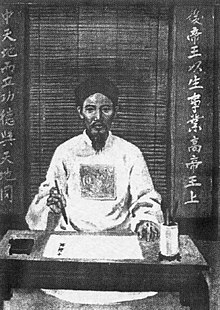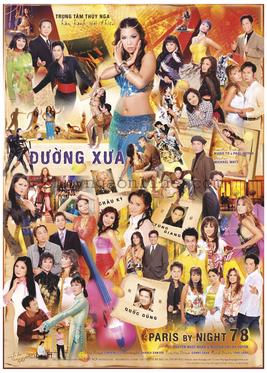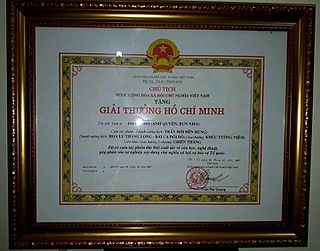
Vietnamese philosophy includes both traditional Confucian philosophy, Vietnamese local religious traditions, Buddhist philosophy and later introducing French, Marxist and other influences.

Vietnamese philosophy includes both traditional Confucian philosophy, Vietnamese local religious traditions, Buddhist philosophy and later introducing French, Marxist and other influences.

Confucianism entered Vietnam and was later reinforced in the four Bắc thuộc periods of Chinese domination, beginning with the first Chinese domination of Vietnam from 111 BCE. [1] This was also the beginning of Taoism in Vietnam and Buddhism in Vietnam. Confucianism was reinforced in government by the Confucian court examination system in Vietnam, as well as the way family raised and taught children toward filial piety, through absolute obedience. [2]
Due to the influence of Confucianism, the feudal state of Vietnam placed early and significant emphasis on expanding education, with a focus on nurturing talented individuals and compiling historical records. As a result, the people became studious, respected teachers, and valued their culture. These factors collectively contributed to Vietnam being a country with a civilization predating many others in the region. [3] Confucianism also played a role in fortifying social order and fostering neighborly relationships. [4] In times of hardship, many individuals valiantly fought and made sacrifices for righteousness, driven by a moral spirit of humanity and a patriotic tradition. This ethos has contributed to a less brutal societal demeanor.
However, Confucianism has also been utilized as a tool by authoritarian regimes to uphold the status quo, often transforming loyalty into an impediment to challenging oppressive forces. This has led to the suppression of dissent and the subjugation of those at the lower rungs of society. While Confucianism promoted cultural and intellectual pursuits, it predominantly emphasized literature and history, often at the expense of science and technology. The pursuit of knowledge was often driven by a desire for scholarly recognition, leading to a focus on fame and position rather than freedom, independence, and self-reliance. Living in harmony and stability has its allure, but it often requires compliance, tolerance, deference to authority, and a reluctance to engage in reform and progress. [5]
Confucianism undoubtedly helped maintain societal order and morality, yet it has also acted as a barrier to democratization, innovative thinking, and societal development.
Most research on Vietnamese philosophy is conducted by modern Vietnamese scholars. [6] The traditional Vietnamese philosophy has been described by one biographer of Ho Chi Minh (Brocheux, 2007) as a "perennial Sino-Vietnamese philosophy" blending different strands of Confucianism with Buddhism and Taoism. [7] Some researchers have found the empirical evidence of this "blending" and defined the socio-cultural phenomenon as "cultural additivity". [8] Another, Catholic, writer (Vu, 1966) [9] has analysed Vietnamese philosophy as constituted of tam tài ("three body" Heaven, Man, Earth) philosophy, yin-yang metaphysics, and agricultural philosophy. [10] Tran Van Doan, professor of philosophy at National Taiwan University (1996) [11] considers that Vietnamese philosophy is humanistic but not anthropocentric. [12]
The confucian poet-philosopher-scholar is typified by Lê Quý Đôn. Other confucianists include Chu Văn An (1292–1370) mandarin, Lê Quát a 14th Century anti-Buddhist Confucian writer, Mạc Đĩnh Chi (1280–1350), Nguyễn Trãi (1380–1442) a famous Đại Việt Confucian scholar, Nguyễn Khuyến (1835–1909). Notable modern Vietnamese philosophers include Cao Xuân Huy (vi, 1900–1983), Nguyễn Duy Quý (vi, born 1932), Nguyễn Đức Bình (vi, born 1927), Nguyễn Đăng Thục (vi, 1909–1999), Phạm Công Thiện (vi, 1941–2011), Trần Văn Giàu (vi, 1911–2010), modern marxist philosopher Trần Đức Thảo (noted in Paris in the 1960s) and Vietnamese Catholic philosopher Lương Kim Định.
Articles related to Vietnam and Vietnamese culture include:
Vietnamese literature is the literature, both oral and written, created largely by the Vietnamese. Early Vietnamese literature has been greatly influenced by Chinese literature. As Literary Chinese was the formal written language for government documents, a majority of literary works were composed in Hán văn or as văn ngôn. From the 10th century, a minority of literary works were composed in chữ Nôm, the former writing system for the Vietnamese language. The Nôm script better represented Vietnamese literature as it led to the creation of different poetic forms like Lục bát and Song thất lục bát. It also allowed for Vietnamese reduplication to be used in Vietnamese poetry.

Paris By Night 91: Huế, Sài Gòn, Hà Nội is a Paris By Night program produced by Thúy Nga that was filmed at the Terrace Theater at the Long Beach Convention and Entertainment Center on January 12, 2008 and January 13, 2008.

Paris By Night 78: Đường Xưa is a Paris By Night program produced by Thúy Nga that was filmed at the Canadian Broadcasting Centre Studio #40 in Toronto, Canada on June 11, 2005. The MC's were Nguyễn Ngọc Ngạn and Nguyễn Cao Kỳ Duyên. Seats are limited to a studio audience and is considered a private event.

Paris By Night 100: Ghi Nhớ Một Chặng Đường is a Paris By Night program produced by Thúy Nga Productions that was filmed at the Planet Hollywood Theatre for the Performing Arts in Planet Hollywood Resort & Casino from July 3–4, 2010 and released DVD on October 7, 2010. The show was hosted by emcees Nguyễn Ngọc Ngạn and Nguyễn Cao Kỳ Duyên.

Paris By Night 99 – Tôi Là Người Việt Nam is a Paris By Night program produced by Thúy Nga Productions that was filmed at Knott's Berry Farm on 16 and 17 January 2010 and released DVD from 9 April 2010. The show was hosted by Nguyễn Ngọc Ngạn, Nguyễn Cao Kỳ Duyên and Trịnh Hội.
The 9th Politburo of the Communist Party of Vietnam (CPV), formally the 9th Political Bureau of the Central Committee of the Communist Party of Vietnam (Vietnamese: Bộ Chính trị Ban Chấp hành trung ương Đảng Cộng sản Việt Nam Khoá IX), was elected at the 1st Plenary Session of the 9th Central Committee in the immediate aftermath of the 9th National Congress.
The 8th Politburo of the Communist Party of Vietnam (CPV), formally the 8th Political Bureau of the Central Committee of the Communist Party of Vietnam (Vietnamese: Bộ Chính trị Ban Chấp hành trung ương Đảng Cộng sản Việt Nam Khoá VIII), was elected at the 1st Plenary Session of the 8th Central Committee in the immediate aftermath of the 8th National Congress.

The Hồ Chí Minh Prize is an honorary award given by the government of Vietnam in recognition of cultural and/or scientific achievement. The prize was established by decree in 1981, and has been awarded in 1996, 2000, 2005 and 2012, often posthumously. The prize is named for Ho Chi Minh, who was Chairman and founder of the Workers' Party of Vietnam, that is considered one of the highest honors bestowed by Vietnam.
The following is a list of political organizations and armed forces in Vietnam, since 1912:

The 10th Central Committee of the Communist Party of Vietnam was elected at the 10th National Congress of the Communist Party of Vietnam. The 10th Central Committee elected the 10th Politburo and the 10th Secretariat.
Story of Nhô village is a 1997 Vietnamese telefilm adapted from Nguyễn Quang Thiều's 1994 novel The assassin of the fields. The film was produced by Vietnam Television Film Center and directed by Đặng Lưu Việt Bảo.

The government of the Nguyễn dynasty, officially the Southern dynasty and commonly referred to as the Huế Court, centred around the emperor as the absolute monarch, surrounded by various imperial agencies and ministries which stayed under the emperor's presidency. Following the signing of the Patenôtre Treaty the French took over a lot of control and while the government of the Nguyễn dynasty still nominally ruled the French protectorates of Annam and Tonkin, in reality the French maintained control over these territories and the Nguyễn government became subsidiary to the administration of French Indochina. During World War II the Japanese launched a coup d'état ousting the French and establishing the Empire of Vietnam which was ruled by the Nguyễn government. During the August Revolution the Nguyễn government was abolished in the aftermath of World War II.

During the Nguyễn dynasty period (1802–1945) of Vietnamese history its Ministry of Education was reformed a number of times, in its first iteration it was called the Học Bộ, which was established during the reign of the Duy Tân Emperor (1907–1916) and took over a number of functions of the Lễ Bộ, one of the Lục Bộ. The Governor-General of French Indochina wished to introduce more education reforms, the Nguyễn court in Huế sent Cao Xuân Dục and Huỳnh Côn, the Thượng thư of the Hộ Bộ, to French Cochinchina to discuss these reforms with the French authorities. After their return the Học Bộ was established in the year Duy Tân 1 (1907) with Cao Xuân Dục being appointed to be its first Thượng thư (minister). Despite nominally being a Nguyễn dynasty institution, actual control over the ministry fell in the hands of the French Council for the Improvement of Indigenous Education in Annam.

The 8th Central Committee of the Communist Party of Vietnam (CPV) was elected at the 8th CPV National Congress. It elected the 8th Politburo and the 8th Secretariat.

The 7th Central Committee of the Communist Party of Vietnam (CPV) was elected at the 7th CPV National Congress. It elected the 7th Politburo and the 7th Secretariat.

The 6th Central Committee of the Communist Party of Vietnam (CPV) was elected at the 6th CPV National Congress. It elected the 6th Politburo and the 6th Secretariat.

The 5th Central Committee of the Communist Party of Vietnam (CPV) was elected at the 5th CPV National Congress. It elected the 5th Politburo and the 5th Secretariat.

The 4th Central Committee of the Communist Party of Vietnam (CPV) was elected at the 4th CPV National Congress. It elected the 4th Politburo and the 4th Secretariat.